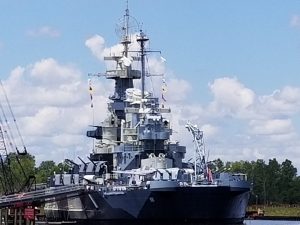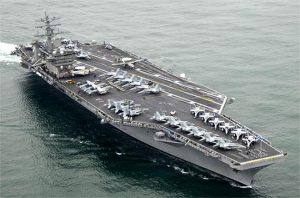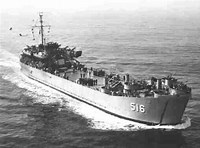


Ships
Purpose
The Ships table is the most comprehensive and nearly complete of the tables in this site. It includes about 48,800 different vessels. It is primarily, but not exclusively, Navy ships, that have helped make American history.
Fewer than half of the vessels in the table are named. Most of the others are identified only by a number but one that is unique to that vessel (called hull numbers by the Navy.) The most famous of the latter is PT-109, John Kennedy’s PT boat that was sunk in World War II. Another famous group is the “LSTs”, the Landing Ships-Tank of World War II fame. (Some crew members who served on these big, ungainly vessels said that LST stood for Large Slow Target.) Following World War II, the Navy started giving the LSTs names, but those in the war were identified only by their hull numbers.
DANFS
The most authoritative and most common source of information about the Navy’s commissioned and named ships, plus the LSTs, is the Dictionary of American Naval Fighting Ships (DANFS). This series of eight books was published by the Navy and was not available through commercial book stores. The books are now out of print, but are available through the used book market. Much if not all of their content is now also available on line at http://www.hazegray.org/danfs/
Many thousands of watercraft had non-unique numbers, or semi-unique numbers, the latter including landing craft that carried the number of the transport that carried them plus a number of their own (such as PA-91-15). I have not tried to include these latter craft in this project.
The World War II Commercial Fleet
The Navy in World War II utilized many commercial vessels, even in the dangerous landing operations, the most famous being the Liberty Ships, which were mostly freighters, and their larger replacements, the Victory Ships. These and other commercial vessels from that war are included in the table. The U.S. built thousands of these ships and other commercial type ships during and shortly after World War II. Lists of the various types of commercial design ships built for the war, and separate lists of what ships were built by each shipyard, are at the Maritime Commission site, http://shipscribe.com/shiprefs/mc/index.html
Some of these were turned over to the Navy to operate, but most were operated by commercial shipping companies, even in battle and particularly in dangerous convoys crossing the Atlantic.
The liberty ships were named for people, and a book has been published that identifies who these people were. It is Liberty Ships, the People Behind the Names, compiled by Capt. Robert Deschamps and published in 1999. It is probably available on line.
The Army’s Ships
The Army has also used thousands of ships and other watercraft over the years, especially in the Civil War and World War II. Major sources of information about these vessels are:
The Army’s Navy Series Volume I, Marine Transportation in War. The U.S. Army
Experience 1775-1860, by Charles Dana Gibson and E. Kay Gibson
The Army’s Navy Series Volume II, Assault and Logistics Union Army Coastal and River Operations 1861-1866 by Charles Dana Gibson and E. Kay Gibson
U.S. Army Ships and Watercraft of World War II, by David H. Grover
Smaller Vessels
Many books and web sites have been published about the tens of thousands of smaller vessels that the Navy used during World War II. I have found several of them and am sure there are many more that I’m not aware of.
Two fine examples are:
Ten Thousand Men and One Hundred Thirty “Mighty Midget” Ships–The U.S.S. LCS(L)s in World War II, by Raymond A. Baumler. This is about the Landing Ship Support (Large) vessels. This book was privately published and printed in 1991 by PIP Printing, Rockville MD.
At Close Quarters, PT Boats in the United States Navy, by Robert J. Bulkley, Jr. This book has extensive information about the history of each PT-Boat, many of the men who served on them, and their organizations. This book was first printed in 1962 for the Navy by the Government Printing Office, and has been reprinted by the Naval Institute Press.
Ruwix is a collection of online puzzle programs and tutorials. Discover the secret of your unsolved Rubix Cube.
NAMENAME
TYPE
HULL_NUM
CLASS
COMM_IS_DATE
RECLASS_NUM
BUILDER
BUILT_CITY
BUILT_STATE
STATUS
DECOM_SUNK_OR_RECLASS
HOME_PORT
SPECIFICATIONS
HISTORYNOTES
Joseph B. Eastman
–
–
–
1944-07-15
–
Bethlehem Fairfield Shipyard, Inc.
Baltimore
MD
–
–
–
–
Maritime Commission E Hull 2655
Merchant ship
Original operator, Polarus Steamship
WW II
Joseph C. Avery
–
–
–
1943-06-03
–
Oregon Shipbuilding Corp.
Portland
OR
–
–
–
–
Maritime Commission E Hull 2020
Merchant ship
Original operator, War Shipping Administration
WW II
Joseph C. Lincoln
–
–
–
1944-07-08
–
New England Shipbuilding Corp.
South Portland
ME
–
–
–
–
Maritime Commission E Hull 3035
Merchant ship
Original operator, Mystic Steamship
WW II
Joseph Carrigan
–
–
–
1945-04-14
–
New England Shipbuilding Corp.
South Portland
ME
–
–
–
–
Maritime Commission E Hull 3103
Merchant ship
Original operator, U. S. Navigation Co.
WW II
Joseph Cudahy
Str
–
–
–
–
Baltimore Drydock & Shipbuilding Co.
Baltimore
MD
Sunk
1918-08-17
–
–
Tanker, built 1917
Chartered by Army Transport Service
WW I –
Aug 1918, torpedoed by German submarine U-90
Sank Aug 17 1918. All but one crew member rescued
Joseph E. Brown
–
–
–
1943-08-31
–
Southeastern Shipbuilding Corp.
Savannah
GA
–
–
–
–
Maritime Commission E Hull 1058
Named for scientist Joseph A. Brown, qv
Merchant ship
Original operator, Cosmopolitan S
WW II
May be Joseph A. Brown
Joseph E. Campbell
APD
49
–
1944-11-24
–
Bethlehem-Hingham Shipyards
Hingham
MA
Decom
1946-11-15
–
–
Named for ENS Joseph E. Campbell, qv
Originally commissioned DE-70, qv
Reclassified APD-49 11/24/1944
WW II
Jun 1945, Operation Iceberg, Okinawa operations
Decommissioned Nov 15 1946
Struck Dec 1 1966
Sold to Chile Nov 1966
1 Battle Star WW II
Joseph E. Campbell
DE
70
Buckley
1943-09-23
*
Bethlehem-Hingham Shipyards
Hingham
MA
Reclas
1944-11-24
–
–
Originally commissioned DE-70
Named for ENS Joseph E. Campbell, qv
WW II
Atlantic
Reclassified APD-49, qv, 11/24/1944
Joseph E. Connolly
DE
450
John C. Butler
1945-02-28
–
Federal Shipbuilding & Drydock Co.
Newark
NJ
Decom
1946-06-20
–
–
Named for CPL Joseph E. Connolly, qv
WW II
Pacific
Decommissioned Jun 20 1946
1 Battle Star WW II
Joseph E. Johnston
–
–
–
1942-11-30
–
Houston Shipbuilding Corp.
Houston
TX
–
–
–
–
Maritime Commission E Hull 113
Named for Confederate General Joseph E. Johnston, qv
Merchant ship
Original operator, United Fruit Co.
WW II
Jun 1944, Operation Overlord, Invasion of Normandy